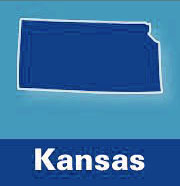Governor Sam Brownback signed a bill today that allows for inspections of abortion centers, allows women a chance to see an ultrasound before an abortion, and bans the use of webcam, or telemed, abortions.
The legislation is nearly identical to the clinic licensure bill that passed in the House and Senate in 2003 and 2005, and was vetoed by then-Gov. Sebelius.
 Kathy Ostrowski, the legislative director for the Kansans for Life organization told LifeNews.com that the bill “will prohibit anyone other than a Kansas-licensed physician from performing surgical abortions or administering abortion by pills; prohibit obtaining abortion pills via ‘webcam”–a new business format pushed by Planned Parenthood under which women only”see” a physician via computer screen; and institute an annual license renewal based on inspection, with an additional unannounced inspection during that calendar year.”
Kathy Ostrowski, the legislative director for the Kansans for Life organization told LifeNews.com that the bill “will prohibit anyone other than a Kansas-licensed physician from performing surgical abortions or administering abortion by pills; prohibit obtaining abortion pills via ‘webcam”–a new business format pushed by Planned Parenthood under which women only”see” a physician via computer screen; and institute an annual license renewal based on inspection, with an additional unannounced inspection during that calendar year.”
The new law will take effect on July 1 and abortion businesses are concerned it will cause them to go out of business. Currently three abortion centers operate in Kansas, Planned Parenthood of Kansas and Mid-Missouri in Overland Park, Center for Women’s Health, in Overland Park and Aid to Women in Kansas City, Kansas.
Mary Kay Culp, executive director of Kansans for Life, told AP the bill is a good thin to start the process of stopping abortions and protecting women in Kansas.
“In order to make money doing abortions, they have to do a lot of them. Medical regulations slow them down,” she said. “Anything we could do to require the clinics to care more about women than about their profit margins is a good thing.”
Peter Brownlie, the Planned Parenthood affiliate’s president and chief executive officer told AP the bill is about shutting down abortion centers.
“None of the requirements that are in the bill do anything to improve the health and safety of services for women,” Brownlie claimed. “The only effect is to make the services more expensive and more difficult to obtain, or more difficult to provide.”
The webcam, or telemed abortion, process has women going to Planned Parenthood for an RU 486 drug-induced abortion getting the drug from a nurse or other employee. The patient is denied an in-person consultation with a licensed physician the FDA suggests and she instead visits with the abortion practitioner via a webcam hookup. The Planned Parenthood abortion business is beginning to use this process in Iowa and is thought to be considering expanding it to more rural and remote areas of other states because of the expense and difficulty in recruiting abortion practitioners and getting them to all of the Planned Parenthood centers in a certain state.
The bill makes it so only licensed physicians can dispense the abortion drug.
Kansas currently has three abortion businesses, none of which advertise doing abortions at or beyond 22 weeks gestation, two physicians’ offices under the authority of the state Board of Healing Arts (KSBHA) and one single-day, Ambulatory Surgical center that Planned Parenthood operates under the authority of the state Health department (KDHE).
The new abortion license of H Sub SB 36 would include specific provisions [pre-and post-surgical] taken from the published “industry standards” of the National Abortion Federation, Ostrowski said. Such provisions are not already mandated by either KSBHA or KDHE and essentially put women at risk at the abortion centers.
KDHE inspects all ASCs every three years, and Planned Parenthood’s last inspection was in 2008, Ostrwoski noted. KSBHA privately inspected the two office/abortion clinics in 2007 and 2009, under agency rules created in response to continued complaints of KFL members about the Christin Gilbert death and horrific conditions at the Krishna Rajanna clinic doing abortions.
“But such inspections are only a baseline, covering facilities that do various non-abortion medical services that have no history of violating patient care for profit margins, the way Kansas abortionists have demonstrated, with unsafe environments, untrained staff, re-use of single-use supplies and advertised “sale days,” the KFL legislative director said.
“Kansas abortionists have been cited for endangering women, both in professional disciplinary actions as well as over 40 malpractice suits for numerous maternal injuries and five deaths of pregnant women,” Ostrowski concluded. “The abortionists have not “voluntarily” followed their own industry standards and need state oversight to do so, under penalty of closing their businesses. That is why the courts have repeatedly ruled that abortion is “different” and that states can regulate abortion clinics without regulating other medical facilities.”
ACTION: Thank Governor Brownback at https://governor.ks.gov/







